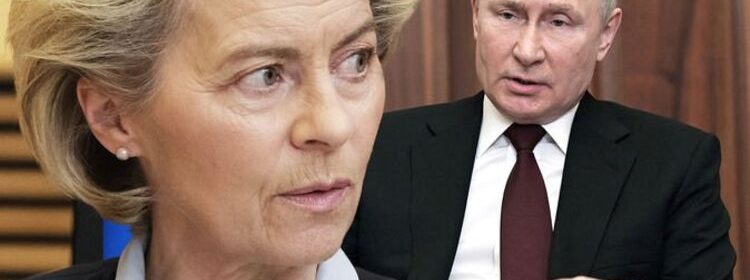‘Credibility of the West at stake’ EU split over embargo on Russian oil and gas

EU 'made themselves dependent' on Russian gas says Portillo
We use your sign-up to provide content in ways you’ve consented to and to improve our understanding of you. This may include adverts from us and 3rd parties based on our understanding. You can unsubscribe at any time. More info
While the UK and US have targeted Russia’s lucrative energy sector in response to the country’s invasion of Ukraine, the European Union’s 27 nations are struggling to find a common voice in whether or not to issue an embargo on Putin’s oil and gas.
Although the EU has imposed hefty measures against Moscow, including freezing its central bank’s assets, its reliance on Russia for 40 percent of its gas makes this a complex question.
The split among the bloc’s members became evident on Monday, as Brussels’ foreign ministers expressed strikingly opposing positions on the matter.
Germany was clear in that it opposed deciding on an embargo, arguing they were all too dependent on Russia’s natural assets – with the Netherlands and Hungary on the same boat.
German Foreign Minister Annalena Baerbock told reporters: “The question of an oil embargo is not a question of whether we want or don’t want (it), but a question of how much we depend on oil.”
Ukraine LIVE: Putin’s mouthpiece admits to 9,861 Russian soldier deaths

Emphasising her country was not the only one that would be impacted by fully cutting ties with Moscow, she said: “Germany is importing a lot (of Russian oil), but there are also other member states who can’t stop the oil imports from one day to the other.’
Ms Baerbock added, however, the bloc must work on reducing its reliance on Russia for its energy needs.
Her stance was echoed by Dutch Prime Minister Mark Rutte, who said many European countries were simply unable to abandon Russian hydrocarbons “overnight” and that an oil embargo would cross a “red line”.
On the other side of the spectrum were France, Ireland and Baltic states such as Lithuania, which signalled support for a harder line.

Lithuanian Foreign Minister Gabrielius Landsbergis said the EU cannot “get tired” of sanctions.
Speaking of the suffering of Ukrainian civilians, he stressed it was “unavoidable” to start discussing a ban on Russian oil imports.
He told reporters: “We have to start [a] discussion about the ‘red lines’ [but] are there any?
“And what would they be?”
“We are seeing thousands of civilians dead, obviously it is still not a ‘red line’.”
Mr Landsbergis warned: “The credibility of the West is on the line.”
DON’T MISS
EU bureaucracy stalls daylight saving time change again [EXPLAINER]
Who could replace Vladimir Putin? Four potential successors [ANALYSIS]
Ukraine fury: Bloc ‘lagging behind’ on fight against Russia [REPORT]

Though the European Commission has set out plans to gradually reduce its use of Russian oil and gas by 2027, no clear decision was reached on Monday.
Mr Landsbergis, showing impatience at the pace of talks, wrote on Twitter after the meeting: “Why should Europe give Putin more time to earn more money from oil and gas?
“More time to use European ports? More time to use unsanctioned Russian banks in Europe? Time to pull the plug.”
EU foreign policy chief Josep Borrell, who called Russia’s siege and bombardment of the port city of Mariupol “a massive war crime”, is eager to ramp up the bloc’s action to “continue isolating Russia”.
Yet, speaking at a news conference, he said concrete decisions would only be made later – but no date was agreed.
One EU diplomat said some hoped the EU would have found enough alternative sources of energy to seriously consider an oil embargo by June.
Another EU diplomat, who spoke on condition of anonymity, said: “We are working on the fifth round of sanctions and many new names are being proposed.”
They did however not specify whether the package would touch upon oil and gas.
Source: Read Full Article
